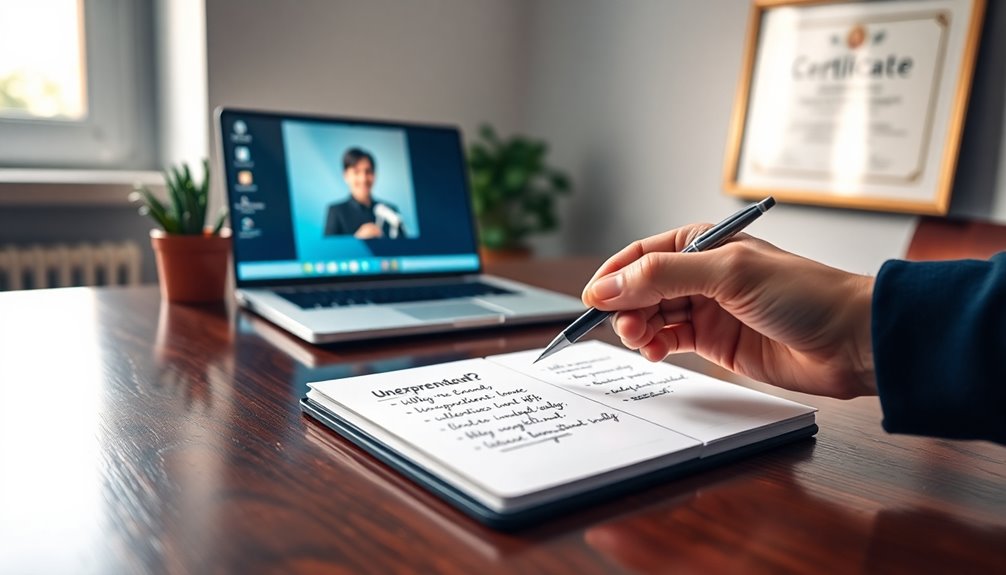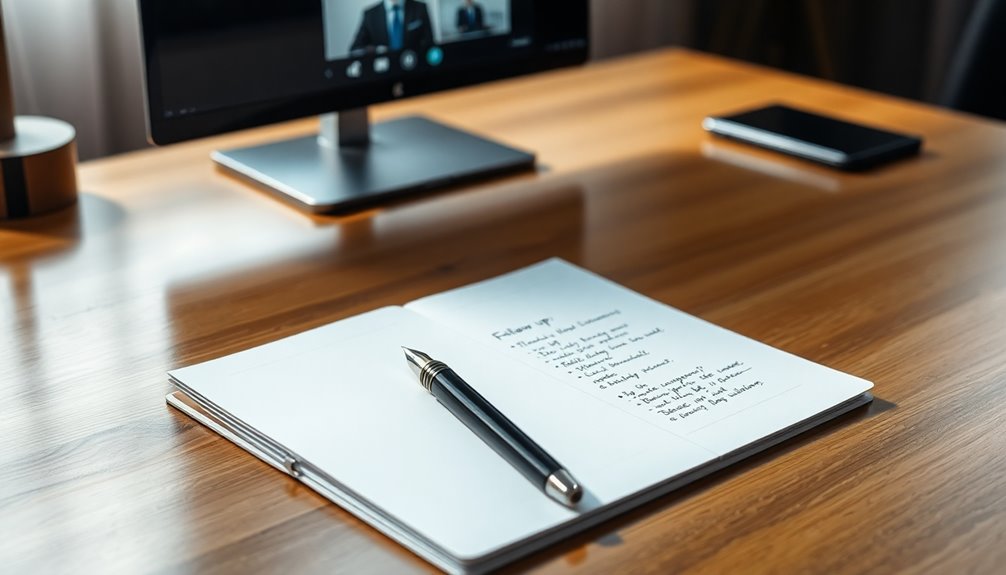To make a lasting impression in your virtual job interview, start by understanding the tech involved and prepare thoroughly. Dress professionally and control your environment by eliminating distractions. Maintain eye contact with the camera to show confidence and lean slightly forward to convey interest. Use clear communication and engage actively with nods and questions. Finally, don't forget to follow up with a personalized thank-you email that reinforces your enthusiasm. Implementing these hacks will set you apart. Keep going to discover even more effective tips that can enhance your virtual interview experience!
Key Takeaways
- Ensure a quiet, clutter-free environment with good lighting for a professional appearance during the interview.
- Dress in solid colors and maintain high grooming standards to convey respect and professionalism.
- Familiarize yourself with the video conferencing platform to enhance your adaptability and comfort during the interview.
- Maintain eye contact with the camera for 60-70% of the conversation to build rapport and convey confidence.
- Follow up with a personalized thank-you email within 24 hours to reinforce interest and highlight key discussion points.
Understand Virtual Interviews

Understanding virtual interviews is essential in today's job market, where flexibility and technology play significant roles in recruitment. As you navigate this landscape, you'll notice that platforms like Zoom, Skype, and Google Meet have become the norm, allowing you to participate remotely without needing to be physically present. This format mirrors in-person interviews, but it emphasizes the importance of professionalism even more.
During virtual interviews, your body language and nonverbal communication can speak volumes. Since the interviewer can't see your full presence, it's vital to maintain eye contact with the camera and adopt an open posture. This shows that you're engaged and interested. Active listening is also key; nodding and responding appropriately can help convey your attentiveness.
As companies embrace remote hiring practices, understanding the nuances of virtual interviews can set you apart. Familiarizing yourself with video conferencing software and practicing your delivery will enhance your chances of making a lasting impression. Remember, the shift to virtual isn't just about technology; it's about showcasing your adaptability and professionalism in a digital world. Additionally, being aware of network configuration errors can help you troubleshoot potential technical issues during the interview.
Prepare Thoroughly
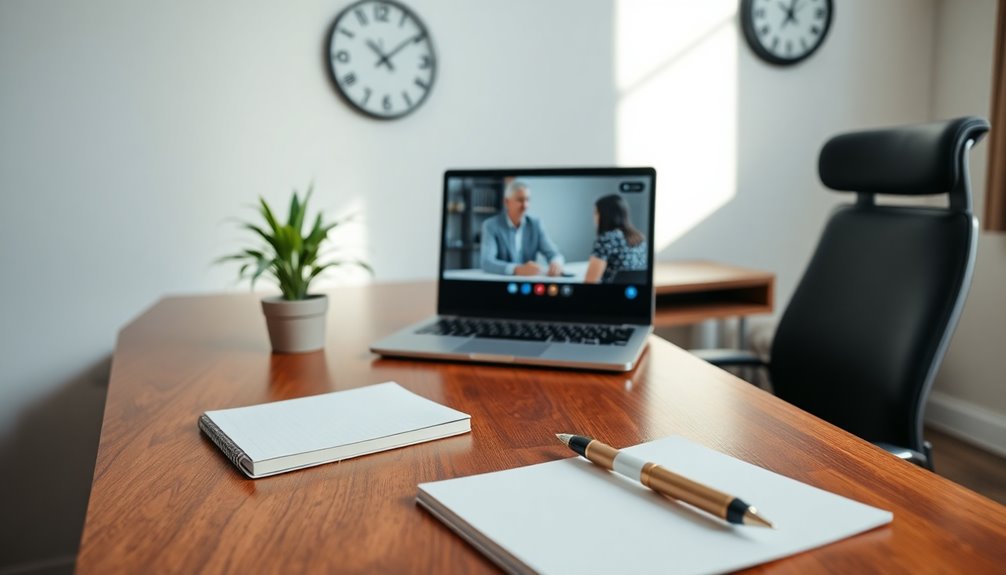
To excel in a virtual interview, thorough preparation is key. Start by researching the company and the specific role. This knowledge allows you to align your skills and experiences with their needs, boosting your confidence during the interview. Next, prepare answers for common interview questions. Practice articulating these responses clearly and concisely, enhancing your communication skills and guaranteeing you make a strong impression.
Don't forget to formulate thoughtful questions to ask the interviewer. This shows your genuine interest in the company culture and job dynamics, setting you apart from other candidates. Additionally, review your resume and the job description carefully. This helps you highlight your relevant experiences effectively throughout the conversation.
While it's important to focus on the content of your responses, you also need to conduct a technology check. Confirm your video conferencing tools are functional and perform a test run to identify any potential technical glitches. By preparing thoroughly, you'll not only feel more confident but also present yourself as a well-informed and engaged candidate, making a lasting impression on your interviewers. Moreover, understanding the rise of remote AI job opportunities can give you insights into the evolving job market and the skills that are currently in demand.
Test Your Technology
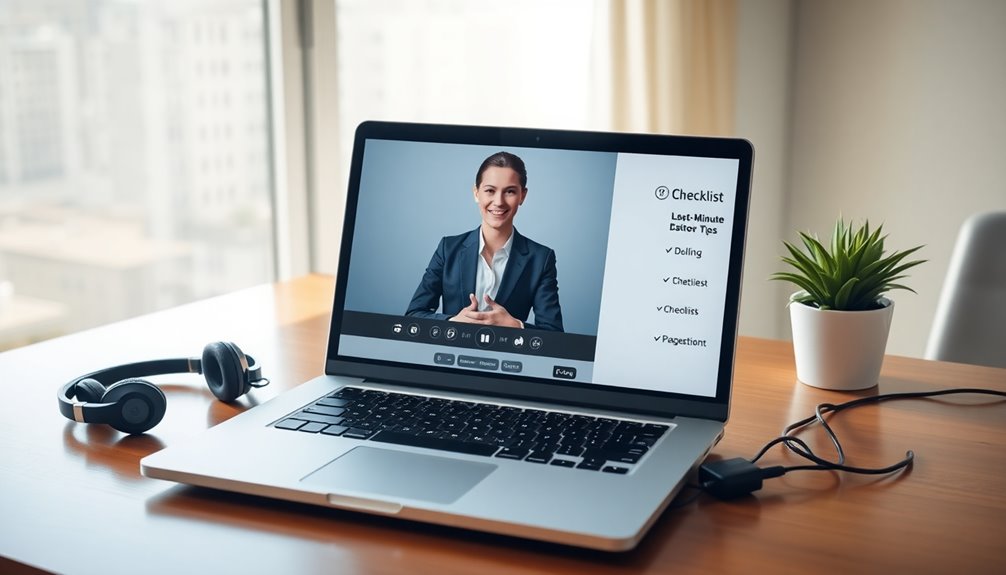
Testing your technology is essential for a successful online job interview. To avoid last-minute issues, conduct a technology check at least 24 hours prior to your interview. Here's a simple checklist to help you prepare:
| Task | Purpose |
|---|---|
| Test Call | Check microphone, camera, and speakers |
| Internet Speed Test | Verify reliable internet (aim for 25 Mbps) |
| Familiarize with Platform | Know features like mute and screen sharing |
| Trial Run | Simulate interview to troubleshoot glitches |
| Software Update | Use the latest version for compatibility |
Use Speedtest or similar tools to confirm your internet speed. Familiarizing yourself with the video conferencing platform's features can boost your confidence and guarantee a smooth experience. A trial run with a friend or family member will help you practice and identify any potential technical glitches. Finally, verify all necessary software is updated to the latest version to prevent any compatibility issues during your interview. By taking these steps, you'll set yourself up for success and make a lasting impression. Additionally, being aware of email and communication security can help protect your personal information during the interview process.
Control Your Environment

Creating the right environment for your online job interview is essential, as it can greatly impact the impression you make. Start by choosing a quiet space, ideally with natural light. This will minimize distractions and enhance your visibility on camera. Inform your family members or roommates about your interview ahead of time so they can help you avoid interruptions.
Next, control your environment by removing any clutter or personal items from the background. A clean backdrop contributes to a professional setting that reflects positively on your image. If your surroundings aren't suitable for the interview, consider using a virtual background. However, guarantee it looks professional and doesn't distract from your presence.
Lastly, test the sound quality in your chosen space. Make sure there's minimal background noise and silence any devices that could interrupt the call. By taking these steps to control your environment, you'll present yourself as prepared and professional, making a lasting impression on your interviewer. Remember, the right setting can enhance your confidence and help you focus on showcasing your skills and qualifications.
Dress Professionally

When you're prepping for a virtual interview, choosing the right attire is essential. Dress in solid colors and professional clothing to create a polished look that reflects your seriousness about the opportunity. Don't forget grooming; it shows you're ready and respect the interview process, even if only your upper body is visible.
Choose Appropriate Attire
Choosing the right attire for an online job interview is essential to making a strong first impression. Dressing professionally sets the tone and conveys your seriousness about the opportunity. Opt for polished attire, like a button-up shirt or blouse, which signals professionalism and aligns with the company's dress code. Solid colors are ideal, as they translate better on camera and help keep the focus on you, rather than distracting patterns.
While it might be tempting to wear casual clothing below the camera, maintaining professionalism above the waist is vital. You never know when you might need to stand up or adjust your camera angle. This attention to detail reinforces a professional image that resonates with interviewers.
Prioritize Grooming Standards
Maintaining high grooming standards is just as essential as your attire during an online job interview. Dressing professionally not only aligns with the company's dress code but also shows respect for the interview process. A polished appearance can create a positive first impression, which is vital in virtual settings.
To enhance your professional appearance, consider the following virtual interview tips:
| Grooming Aspect | Importance |
|---|---|
| Neat Hair | Reflects attention to detail |
| Minimal Accessories | Avoids visual distractions |
| Clean Clothing | Presents a polished image |
| Good Posture | Conveys confidence |
| Appropriate Makeup | Enhances features without being distracting |
Even if only your upper body is visible, dressing for success throughout keeps you in a positive mindset and ready for any unexpected camera adjustments. Remember, your grooming standards are part of your overall presentation, and they can greatly impact how interviewers perceive your professionalism and suitability for the role. So, take the time to prepare—your effort will pay off! Additionally, adopting a consistent approach to financial planning can help alleviate stress during the job search process, allowing you to focus on making a great impression.
Maintain Professional Colors
Dressing in professional colors for your online job interview sets the tone for your interaction and reflects your commitment to the position. When you choose solid colors over busy patterns, you enhance clarity on video calls and project a polished appearance. Opt for professional attire, like blazers or button-up shirts, that align with the company's dress code. This not only shows you understand the company culture but also demonstrates your seriousness about the role.
Be Punctual

Being punctual is essential for a successful online job interview. Logging into the video chat platform 5-10 minutes early allows you to check that all your technology is functioning properly. This way, you can avoid any last-minute technical glitches that could disrupt the flow of your conversation. Being punctual not only showcases your professionalism but also demonstrates respect for the interviewer's time, setting a positive tone for the meeting.
Unlike in-person interviews, where arriving 10-15 minutes early is common, a few minutes early is sufficient for virtual interviews due to the nature of the format. Before the scheduled meeting, verify your internet connection is stable and your software setup is ready to go. Arriving early gives you the chance to calm your nerves and mentally prepare for the interview, enhancing your overall performance.
Maintain Eye Contact

Eye contact plays a pivotal role in virtual job interviews, as it conveys confidence and helps build a connection with your interviewer. To effectively maintain eye contact, position your video call window near your webcam. This way, you can look directly at the camera while still seeing the interviewer. It's not just about staring at the screen; it's about creating an engaging atmosphere that fosters trust.
Studies show that direct eye contact enhances perceptions of trustworthiness and credibility, making it essential for virtual communication. Aim to maintain eye contact for approximately 60-70% of the conversation to strike the right balance between engagement and natural interaction.
Be mindful of your camera placement by adjusting your seating position to guarantee your face is well-framed and visible. This promotes better eye contact throughout the interview, allowing your facial expressions to shine through. Remember, effective eye contact not only boosts your confidence but also encourages the interviewer to engage more deeply with you. By focusing on maintaining eye contact, you'll leave a lasting impression and demonstrate that you're both present and invested in the conversation.
Engage Actively

Active engagement during a virtual job interview is essential for making a strong impression. When you engage actively, you create a connection with the interviewer that can set you apart from other candidates. Here are three key strategies to help you shine:
- Maintain Eye Contact: Look directly at the camera instead of the screen. This mimics in-person interactions and shows confidence.
- Use Body Language: Lean slightly forward to convey interest, and avoid fidgeting or distractions that can detract from your presence.
- Ask Clarifying Questions: If something isn't clear, don't hesitate to ask. This not only demonstrates your interest but also encourages a more dynamic conversation.
Additionally, nodding and using verbal affirmations can show you're actively listening. It's essential to summarize key points or insights shared by the interviewer to reinforce your understanding and keep the dialogue flowing. By implementing these strategies, you'll create a memorable interaction that highlights your engagement and enthusiasm. Remember, making eye contact and using effective body language are just as important in a virtual setting as they are in person.
Minimize Interruptions
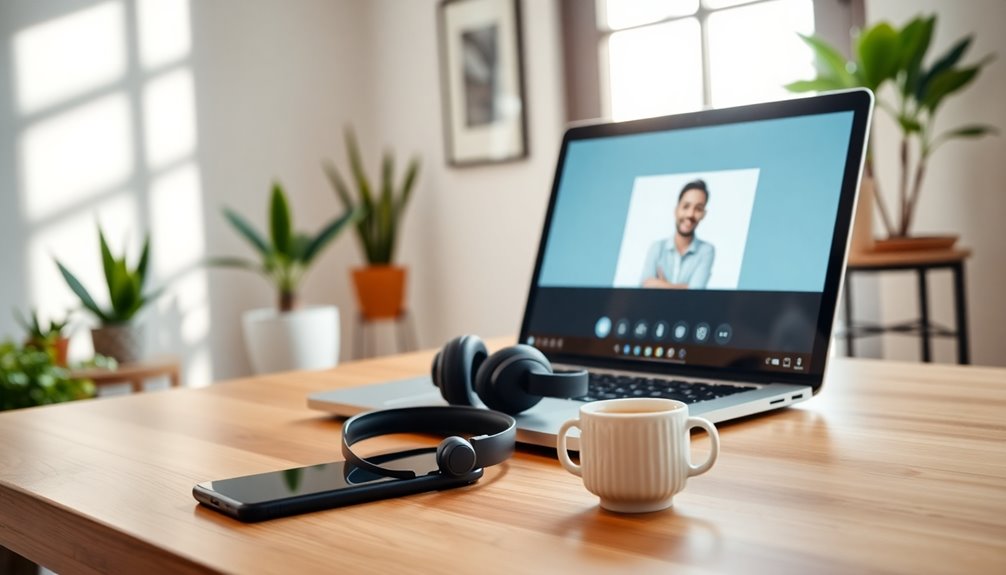
To guarantee a smooth online job interview, it's important to minimize interruptions that could disrupt your focus and professionalism. Start by informing family members or roommates about your interview schedule. This simple step can help prevent unexpected interruptions during the call. Next, silence your phones and notifications on all devices, and activate "do not disturb" mode on your communication tools to minimize distractions.
Choosing a quiet space is vital. Find a location free from background noise and interruptions, ideally one with a door that can be closed. This will create an environment conducive to a professional conversation. However, it's wise to prepare for potential interruptions by having a backup plan. Consider having a secondary device or a phone number ready for an audio call in case of technical issues.
If an interruption does occur, acknowledge your environment to the interviewer. This shows that you're aware of your surroundings and helps maintain professionalism. By taking these steps, you'll not only minimize interruptions but also make a lasting impression during your online job interview.
Follow Up Effectively
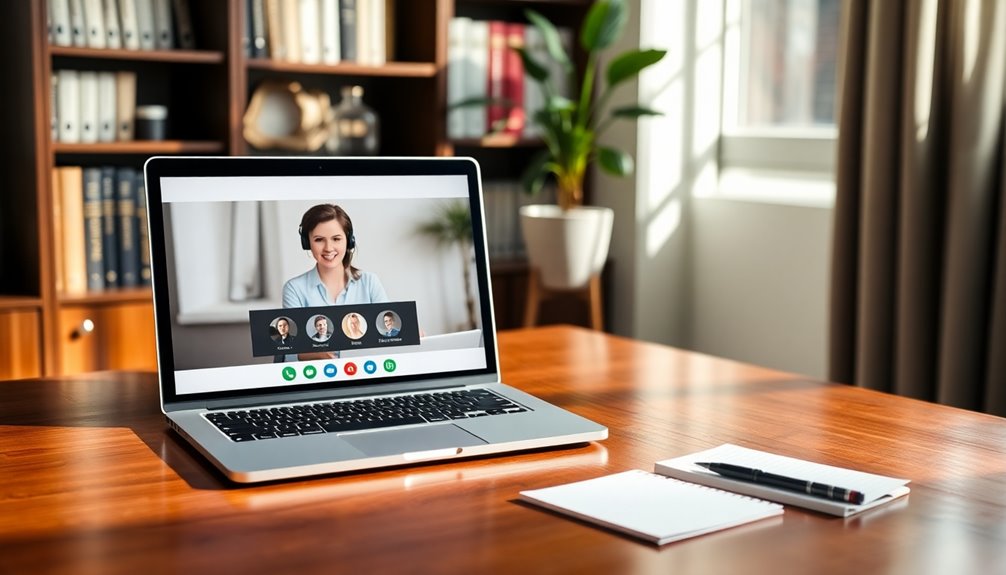
After your interview, send a thank-you email within 24 hours to show appreciation and keep the momentum going. Mention specific points from your conversation to reinforce your interest and demonstrate attentiveness. This simple gesture can make a big difference in how you're perceived as a candidate. Additionally, consider how emotional support can enhance your confidence during the interview process, helping you to present yourself more effectively.
Timely Thank-You Email
Sending a timely thank-you email can be an essential step in solidifying a positive impression after your online job interview. It shows your professionalism and reinforces your interest in the position. Here are three key components to include in your thank-you email:
- Personalization: Reference specific topics discussed during the interview. This illustrates your attentiveness and genuine interest in the role and the company values.
- Reiterate Your Fit: Highlight how your skills align with the company's needs. Reaffirming your interest in the position can strengthen your candidacy.
- Polite Inquiry: Ask about the timeline for the hiring decision. This shows your enthusiasm and helps you manage your expectations moving forward.
Make sure to send your thank-you email within 24 hours of the interview to demonstrate promptness and enthusiasm. Keep the tone professional and concise, ideally limiting it to a few paragraphs to respect the interviewer's time. A well-crafted thank-you email not only reinforces your interest but also serves as a final opportunity to remind them of why you're the right fit for their team.
Reinforce Interview Discussion Points
Following up effectively after your online job interview can greatly enhance your candidacy. A well-crafted follow-up email reinforces your interest and keeps you top of mind for the hiring team. Send your thank-you note within 24 hours, expressing gratitude for the opportunity. Make it personal by mentioning specific discussion points from the video call; this shows attentiveness.
Here's a simple structure to guide your follow-up:
| Element | Purpose | Example |
|---|---|---|
| Thank You | Express gratitude | "Thank you for the opportunity." |
| Specific Discussion | Demonstrate engagement | "I enjoyed discussing project XYZ." |
| Skills Highlight | Reinforce fit for the role | "My experience in ABC aligns well." |
| Hiring Decision Query | Show enthusiasm | "What's the timeline for the hiring decision?" |
| Additional Thoughts | Address any lingering questions | "I thought more about our discussion on DEF…" |
Maintain a professional tone while keeping it concise. This follow-up is not just a courtesy; it's a strategic move to solidify your candidacy and showcase your continued interest in the position. Additionally, employing online reputation management strategies can further enhance your professional image in the eyes of potential employers.
Frequently Asked Questions
How to Impress the Interviewer in an Online Interview?
To impress the interviewer in an online interview, you'll want to dress professionally, even if it's just from the waist up. Keep eye contact by positioning the video window near your webcam, and actively listen, responding thoughtfully to show engagement. Prepare meaningful questions about the role and company culture, demonstrating your research. Finally, follow up with a personalized thank-you email, referencing specific topics to reinforce your interest and professionalism.
What Are the Five C's to Remember in an Interview?
When you're preparing for an interview, remember the five C's: Clarity, Confidence, Connection, Competence, and Courtesy. You need to articulate your thoughts clearly, showing confidence through your body language and eye contact. Build a connection by listening actively and engaging in small talk. Demonstrate your competence with specific examples of your experiences, and always maintain courtesy by greeting warmly and following up with a thank-you note. These elements will help you shine.
How to Ace a Virtual Job Interview?
"Preparation is the key to success." To ace a virtual job interview, start by researching the company and role, so you can tailor your answers. Test your tech to avoid glitches, and dress professionally to make a strong impression. Choose a distraction-free space with good lighting, and engage actively by maintaining eye contact and using confident body language. With these tips, you'll showcase your enthusiasm and professionalism effectively.
How Do You Make a Good First Impression in a Virtual Interview?
To make a good first impression in a virtual interview, dress professionally from head to toe and log in a few minutes early to test your tech. Maintain eye contact by looking at the camera and greet your interviewer warmly. Use positive body language to show engagement, and don't forget to prepare thoughtful questions about the company. These actions will help you establish rapport and convey your genuine interest in the role.
Conclusion
As you step into the virtual interview, remember it's your moment to shine. Picture yourself confidently maneuvering the digital landscape, like a captain steering a ship through calm waters. With your preparation and passion, you'll create ripples that leave a lasting impression. Just like a vibrant sunset that lingers in the sky, your presence will be remembered. Embrace the experience, follow up with gratitude, and watch as new opportunities bloom on the horizon. You've got this!



